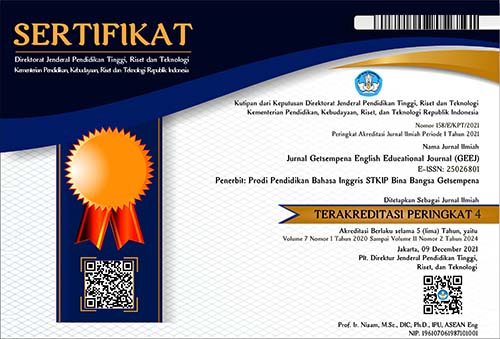CHILDREN'S LANGUAGE DEVELOPMENT
Abstract
The objective of this article is to describe how children's language is developed. The development of child's language actually begun when a child was born with language or a simple talk. First language is the language that is the primary language that is acquired which is called native language or mother tongue. This study is intended to children's language development and their social interaction. To get the data, four children asked to speak about everything of their interest. The process of recording was made as naturally as possible. All the data obtained were then used to facilitate the researcher in describing children's talk. As the result, children direct his attention to thing that language is easy to understand and they used primary interest to help them learn the language related to their interest. They also enjoyed the repetitive events of their life and used it strategies to help them in learning a language. Children can quickly acquire new words if they always heard a new language around them and automatically the development of their language will increased faster. Children learn language through their natural desire to call an object by its name and almost all of the words their produced were not clear enough. They often used a piece of dismembered words.
References
Agustien, H.I.R. (2006). Competence-Based Curriculum and Its practical Implications. Presented at UTB International Seminar, Bandung 22 February 2006.
Barnet, A.B. and Barnet, R.J. 1998. The youngest Minds, Parenting & Genes in the Development of Intellect & Emotion. New York: Simon and Schuster.
Chomsky, N. 1972. Chomsky: Selected Readings. London: Oxford University Press.
Clark, E. V. 2002. First language acquisition: Cambridge University Press.
Cole, M. and S. 1996. The Development of Children. 3rd ed. New York: W.H. Freeman and Company.
Eliot, L. 1999. What's Going On in There? How the Brain and Mind Develop in the First Years. New York, NY: Bantam Books.
Ervin-Tripp, S. 1973. Language Acquisition and Communicative Choice. Stanford: Stanford University Press.
Hornstein, L. M. A. a. N. (Ed.). (2003). Chomsky and His Critics. USA: Blackwell Publishing Ltd.
Merkel-Piccini, Robyn A. 2001. Early Language Development. Super Duper Publication. www.superduperinc.com.
Pinker, S. 1994. The Language Instinct: How the Mind Creates language. New York: Harper Perennial.
Piaget, J. 1970. Science of Education and the Psychology of the Child. New York: Viking.
























